












A NEW €350 million aid package for households and workers affected by last October’s Valencia flood disaster will be distributed automatically by mid-October.
Regional president Carlos Mazon said the extra money is down to a ‘deep and permanent self-evaluation’ on how to optimise the response to the October 29 floods.
Nearly 40,000 households affected by the floods who have already got €6,000 in aid, will get an extra €3,000 without having to apply.
The 87,000 owners of damaged vehicles will receive up to €2,500 extraabove money already handed out.
Mazon said that ‘more than 5,000 self-employed workers who were forced to continue paying contributions despite not being able to work’ will receive up to €3,000 each.
Some 12,000 workers who were affected by temporary redundancy plans and who have already received aid will get a supplement of €360. The president criticised the national government which ‘has only delivered 30% of the promised aid’.
“It is not the citizens who have to ask for help, but that the administration already knows that they need help and has to provide it,” Mazon stated. He said his government over the last 10 months has made ‘the largest deployment of material and human resources in its history’.
“We have invested €1.15 billion to rebuild infrastructures and help those affected without receiving a single euro in non-refundable funds from the Government.
“It is urgent to get the rest of the aid from the Government that has taken too long to arrive,” added Mazon.





A MISSING British toddler may have been snatched in Marbella and taken to Thailand by his mother, a Russian ‘relationship influencer’.
Oliver Pugh, 3, has not been seen since July 4, when he vanished from the Costa del Sol resort.
His father, Matthew Pugh, 36, who has sole custody, eventually reported him missing a month later.
After a desperate global search, it appears Anastasiia Chikina may have fled to Thailand to avoid losing custody of Oliver, who carries a British passport.
Recent photos uploaded to her social media appear to place her at Bangkok’s upmarket Iconsiam shopping centre, rather than in Russia as originally feared by Spanish police.
The images show the 32-year-old social butterfly and her 15-yearold sister at various locations including passing a luxury Cartier store.
Armchair detectives managed to match escalators, benches and general background scenery to confirm the Bangkok location.


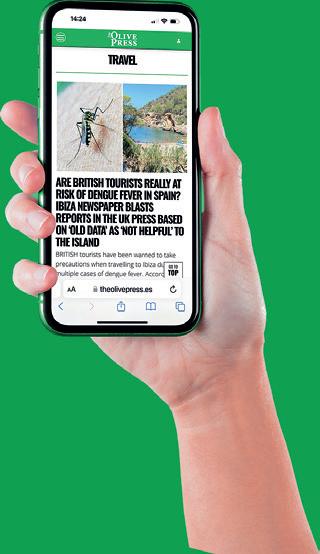

By Walter Finch
“Oliver needs and deserves to have both parents in his life.
“By taking him away from his father, his friends, and everything familiar, the only one who is truly hurting is him.”
He described Oliver as a ‘bright and active boy’ who loves cars, aeroplanes and ‘playing in the water’.
Chikina finally broke her silence at the weekend in a post to her 140,000 followers.


The breakthrough has given new hope to Oliver’s father, a former CEO of a UK-based web hosting company, from Bedford.
Thai authorities are much more cooperative in extradition cases than Russia, which notoriously never extradites its own citizens.
In an emotional appeal this week, Pugh pleaded directly with his ex-partner for his son’s safe return.

Her cryptic missive justifying her actions, started:
“We have a difficult conversation to have. Talk about how scary it is when the system is against the child.
“We have time, not much, but we have it, to understand the truth.”
She continued:
“The truth won’t be pleasant for everyone; it often stays behind closed doors, but here it comes out.”
Oliver’s father is now offering €100,000 for information about his son’s whereabouts.
Chikina was banned from leaving Spain by a Marbella court and ordered to surrender Oliver’s passport - however she claimed she had lost it.
Crucially, the Olive Press understands, she fled just as she was about to lose a bitter custody battle.
A Spanish court has since ruled his father should have full custody with supervised visits only from his mother. The influencer, though, had already

ina’s phone stopped connecting entirely.
“Anastasiia ran off with Oliver when she realised





THIEVES posing as charity workers stole 300 tonnes of donated clothes worth €1 million in Valencia. Thirteen people have been arrested after police uncovered the scam targeting aid containers.
SPANISH woman
Matilde Munoz, 72, has been murdered in her Lombok (Indonesia) hotel room during a robbery. Two men, including a hotel worker, have confessed and been arrested for premeditated murder.
A NOTORIOUS Italian mafia boss living under a false identity in Alicante was arrested by Guardia Civil after social media posts helped track him down to Spain.
A 55-year-old fake healer in Pontevedra has been arrested for convincing women they needed to have sex with him to be ‘cured’. He faces indecency charges but was released on bail.
SEVEN people have been arrested in the Vega Baja region over a phone scam where 42 victims across Spain were conned out of €100,000. The con mastermind was detained in Benferri with computer equipment removed from his home for analysis. Three others are still under inves-
tigation. The 18-month Guardia Civil probe started in January 2024 after several complaints from Alicante province about suspicious phone calls.
The fraudsters impersonated bank officials and even used genuine bank phone numbers to display on phone devices. Victims were offered technical assistance and were persuaded to validate bank transactions or provide code numbers, which allowed the fraudsters access to their accounts.
IRISH mobster John Gilligan has been released from prison after being arrested in December for running a pink cocaine drug laboratory at his Orihuela Costa home.
His lawyer, Aitor Esteban Gallastegni, managed to secure bail at €10,000 following delays in getting analysis of the
By Walter Finch
seized narcotics. Gilligan, 73, has surrendered his passport and will have to
A MAN was shot dead in the centre of Xirivella on the outskirts of Valencia in broad daylight.
The brazen assassin escaped at highspeed in a dark-coloured car after firing three bullets into his target’s back
A passer-by described the killer as a bearded man dressed in black who shouted: “I have to kill you.”
The victim, 35, stumbled for around 15 metres before collapsing next to a pedestrian crossing in the vicinity of Plaza Gerardo Garces.
He had been homeless after being released from prison a few months ago on the back of over 20 arrests.
Police believe he was killed over a crime-related debt.
report regularly to the Torrevieja court. Two others were also bailed - also down to the delayed drug test

the Policia Nacional. Officers closed down the drug lab which had a capacity to make between 300 and 600 kilos of narcotics.
A revolver was also allegedly found hidden at Gilligan’s home and numerous mobile phones were removed.
The raid on Gilligan’s villa was executed after a big increase in
two addresses in the Murcia district of La Alberca where quantities of the drug were found.
In September 2023, Gilligan avoided jail after agreeing a plea bargain over drug trafficking and gun possession charges, following raids in the Torrevieja area three years earlier.
THE Portuguese Navy has been hailed for its quick action after launching a dramatic high-seas operation to stop armed drug traffickers who had hijacked a container ship bound for Malaga.
At least two gunmen with Eastern European accents stormed the Liberian-flagged vessel Odysseus shortly after it departed Vigo port forcing crew members into the engine room at gunpoint while they searched for the stashed cocaine.











The UK’s National Crime Agency identified a Macedonian family gang that acted under Gilligan’s orders for the systematic manufacture and distribution of different types of narcotic substances in Murcia. Eight alleged members were arrested by












of the gang pink cocaine was detected in leisure areas of Murcia. Searches were also carried out at results.

He was accused of masterminding an operation to smuggle cannabis and powerful sleeping-pills to his native Ireland in consignments of flip-flops.














The container ship, which had previously docked at cocaine-infested Ecuadorian ports including Guayaquil and Posorja, was travelling the notorious South America-to-Spain drugs route when the hijacking occurred. Portuguese naval forces received an emergency alert and immediately deployed a warship, helicopter and specialist assault team to intercept the vessel off the Algarve coast. The military operation successfully regained control of the ship - but the armed attackers had already fled.


Despite prosecutors wanting him jailed for over eight years, the deal gave him a 22-month suspended sentence and fines amounting to around €14,000. Gilligan spent 17 years in an Irish jail before being freed in 2013 after he was convicted of running a large-scale drug trafficking gang in the 90’s that netted over €35 million.







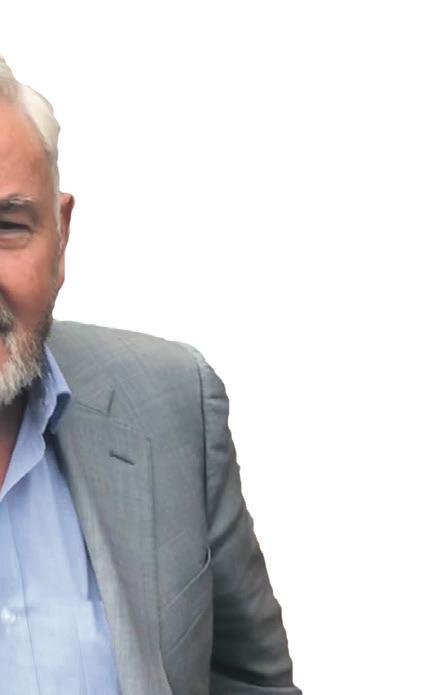
He was acquitted in 1996 for the murder of journalist Veronica Guerin with associate Brian Meehan receiving a life sentence for the killing.







BRITISH rock band Radiohead have announced they will perform in Spain for the first time in 22 years.
Their first live show anywhere for seven years will be at Madrid on November 4, followed by three more shows that week.
But will new World No 1 Carlos Alcaraz make it to play Denmark in the Davis Cup this weekend?
IT is all set to be the hottest ticket for tennis fans when Spain and Denmark go head to head in the Davis Cup this weekend.
A sell out tie at Marbella’s Puente Romano hotel, could herald new World No 1 Carlos Alcaraz’s first outing after winning the US Open at the weekend.
But uncertainty now surrounds whether Alcaraz can make it, after he said he was suffering from ‘muscular and mental fatigue’. While the Murcian admitted he ‘feels bad’ about not turning up, he said the threeweek New York tournament had caused ‘tiredness’ and a
By Adam Husicka
‘hectic diary’. It is not as if he needs the money, after picking up the highest ever winning cheque in tennis history, a cool $5 million, after dispatching rival Sinner in a four-set masterclass on Sunday. Either way hundreds of Danish expats queued up to secure one of the much sought after seats at the expanded 5,000 seater venue. Denmark’s chances are heavily relying on Holger Rune, 22, who at World No 8 is one of the brightest stars on the ATP Tour.
Taking place at the Movistar Arena, they will then move on to Italy, Denmark, Germany and the UK
The Madrid dates will be the only Spanish concerts of the tour, which marks the band’s return to live performances after their last tour in 2018.

“He is a very exciting young talent who has beaten Alcaraz a few times,” said Marbella businessman Janus Nielsen, whose company AnyTech 365, sponsored three ATP tournaments at the venue from 2021 to 2023.
“I actually gave both Rune and Carlito wild cards in 2021 as they were such exciting talents,” he told the Olive Press.
“Carlito was just 16 and at 150th in the world, while Rune was at 200th.
“It is amazing how they have

developed and in terms of wins they are now neck and neck at about two each.
“The first time I watched Carlito play in our tournament in Marbella, an Austrian coach who helped me organise it said: ‘that boy will one day be World No 1’. He was right.
“He’s an extraordinary talent.”
The question remains whether captain David Ferrer will be able to count on him, alongside Olympic champion Marc Lopez.
COME on people what’s going on here? I’m pretty much convinced with the idea that the UK is suffering from a huge lack of common sense, but what the hell is going on when it comes to ‘el sentido comun’?
The police say they have arrested 48 suspects relating to arson causing wildfires that have consumed more than 400,000 hectares of land across Spain. They also have 134 suspects under investigation. Again, what the hell is going on here!?
The headline suggests hundreds of firebugs running about the place setting fires for the sheer joy of seeing wildfires racing though the country, destroying whatever gets in their way. But looking at the details of those arrested the truth is more Homer Simpson than Herostratus. And, if you don’t believe me, have a think about the two idiots who set off an uncontrollable blaze in A Rua (Ourense). They were trying to strip the plastic coating off a load of stolen copper cable… in open country with petrol and a blow torch. Or there is another pair of rocket scientists who it seems wanted to even up the odds between themselves and the local wildlife, so they could more easily hunt them down. Yep, these s**t hunters decided to burn off the undergrowth, so their prey had nowhere to







JENNIFER Lawrence will be honoured with a lifetime achievement award at Spain’s San Sebastian Film Festival this month - and break a record.
The 35-year-old Oscar-winner is expected to fly into the Basque resort to pick up the coveted Donostia Award on September 26 – making her the youngest star ever to receive it.





Festival bosses have called Lawrence ‘one of the most influential actors of our time’, pointing to her smash-hit turns in The Hunger Games and Silver Linings Playbook, which earned her an Oscar at just 22. Her latest film Die, My Love, which she stars in and produced, will be screened straight after the ceremony.






Dozens arrested as brainless crooks spark wildfires with blowtorches, stolen cables and hunting stunts
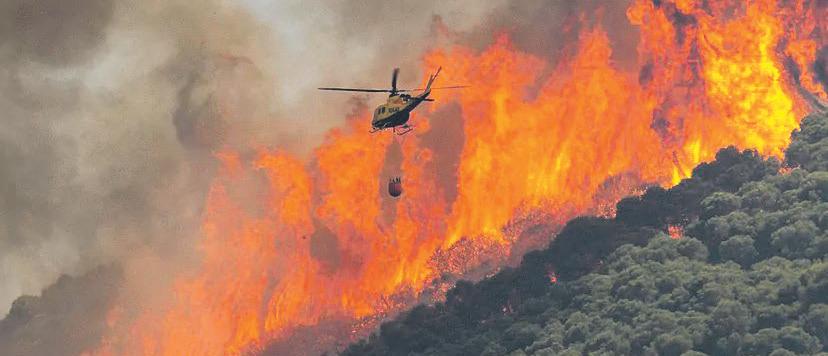
hide. I’ve never understood hunting animals with guns. Where’s the sport in that? But when the technological advantage isn’t enough, what kind of lame brain puts a match to nature to stack the deck even more? Anyway, what we seem to have here is not an epidemic of firebugs; it’s a load of crazies, some on the criminal spectrum, who have no idea of the consequences of their actions. Come on people, it’s 40 degrees, hotter in some areas. Once a small blaze gets going it becomes a big huge and dangerous wildfire. I never thought I’d be saying this, but Europe is getting hotter, and we need to get more sensible about the way we live. Even criminals need to be careful not to destroy nature.
In the UK temperatures are now also regularly hitting 100 degrees (in old money). There are signs everywhere telling people not to light bonfires or barbecues in open spaces. The difference is in Blighty the weather has traditionally been so miserable that outdoor cooking (or even a bit of criminal activity) on a flame has never really been a thing. Brits don’t barbeque unless they’re on a patio with a gas powered grill.
So how about people of all races and persuasions stop setting fires for lunch, criminal pursuits or ‘evening’ up the odds with the local rabbit population. Whether you agree with the global warming crisis theory or not, it’s getting bloody hot lately, how about people get a brain and stop lighting up the countryside?
HE’S the cyborg assassin who made ‘I’ll be back’ and ‘Hasta la vista, baby’ two of the most iconic lines in movie history. Now Arnold Schwarzenegger really will be back… in Spain.
‘I’M BACK!’
The Austrian-born Hollywood icon first shot to superstardom in Conan the Barbarian - which was shot in Madrid, Cuenca and Almeria.









He has now been confirmed as the guest of honour at the very first San Diego Comic-Con Malaga later this month.


The event, running from September 25 will see more than 120,000 visitors pack into 82,000 square metres of geek heaven, with over 300 hours of exclusive content.









THREE racing pigeons valued at €170,000 and owned by a syndicate have been stolen from Fortuna in the Murcia region.
The birds called Sordo, Gran Capitan, and Joker are regarded as top-notch racers and were taken on August 24. They have dominated recent events in the Valencia and Murcia regions.
The Guardia Civil are focusing on pigeon owners and breeders with previous arrests for similar thefts - albeit of lower value birds.
Dovecote owner and a member of the Pedrto de Civa six-man syndicate, Jose Francisco Fernandez, said:
“There were 40 pigeons and they only opened the cages of the three most valuable ones.”
“They knew they were there, and that we hadn’t yet set the alarm. They planned the robbery in detail,” he added.
Urgent embargo on weapons to Israel called as Spain officially dubs Gaza action as ‘genocide’
By Adam Husicka
SPAIN has become one of the first countries to openly describe Israel’s war on Gaza as ‘genocide’.
The government has also now ordered a total embargo on all weapons to the country, as it intensifies its offensive on the Palestinian enclave.
Prime Minister Pedro Sanchez called out Israel saying it had displaced almost two million and left ‘hundreds of thousands facing hunger’. And while it had the right to defend itself, ‘bombing hospitals and starving children’ cannot be justified as self-defence.







cials and military figures, will be prohibited from entering Spain.







It is the first time Sanchez has used the word ‘genocide’ to describe the offensive, a term previously avoided by the Spanish government.
Foreign Minister Gideon Saar immediately accused Sanchez of antisemitism and announced ministers Yolanda Diaz and Sira Rego would be banned from entering Israel. The dispute highlights growing tensions between Madrid and Tel Aviv after Spain became one of the first European


info@energynordic com 900 696 820 (freephone) energynordic com
countries to formally recognise Palestine earlier this year. As part of the new measures, ships carrying weapons or fuel for the Israeli army will not be allowed to dock in Spanish ports. Meanwhile all aircraft transporting defence equipment will not be allowed to fly through Spanish airspace. Individuals accused of direct involvement in the conflict, including government offi-
The government will additionally restrict imports of goods made in Israeli settlements in the occupied West Bank and scale back consular services for Spanish citizens living there.
Sanchez announced increased support for Palestinians, including new cooperation projects with the
Palestinian Authority, an additional €10 million for UNRWA, and humanitarian aid for Gaza totalling €150 million.
He admitted Spain cannot stop the war alone but said the country has a duty to act.
“Spain does not have nuclear weapons or aircraft carriers,” he said. “But we can show leadership, and we can make clear which side of history we stand on.”
A YOUNG man found battered to death on an isolated ‘hippy’ beach has been named as 23-year-old Mario Belmonte, the Olive Press can reveal.
His bloodied body was discovered at ‘an isolated cove’ near trendy Las Negras, in Almeria’s Cabo de Gata Natural park.
Investigators are exploring whether his murder may have been linked to the local drug trade, with one theory pointing to a dispute involving so-called ‘hippy dealers’ who operate from San Pedro beach.
Sources close to the victim’s family have told us detectives are interested, in particular, to
speak with four men seen getting out of a car on the night of the killing.
Police have since seized CCTV from around Las Negras in an effort to identify the suspects.
“There are so many police here now – everyone is very anxious to find out what happened,” said the German family friend.
The expat source added Mario appeared ‘nervous’ in the days before his death. “He was planning to go to Mallorca this month,” she revealed. “He had been quite nervous and we didn’t know why.”


Mario had just spent two months living at secluded San Pedro beach, which has a long-standing reputation as a hideaway for hippies.
The residents - often numbering hundreds, mostly from Northern Europehave lived in the old ruins of San Pedro castle for decades. Located within the natural park, it is only accessible on foot or by boat.
Police have so far not commented publicly on the case.
By P OO LVILLAS









THREE young immigrants were beaten up by masked attackers allegedly linked to a neo-Nazi group with British connections.
A pair of hooded men assaulted two random minors and an accompanying adult who were staying in the Madrid centre, with one child requiring hospital treatment.
The attack on September 1 was applauded by Nucleo Nacional, a fascist organisation whose members are believed to be behind the assault.
The group are notorious for hiding their identities and wearing balaclavas, but were recently revealed as led by brothers Ivan and David Rico.
According to the British anti-racist magazine Spotlight they are the sons of a wealthy businessman who previously served as a councillor for Spain's Popular Party.
They have close links to the farright Vox party and direct ties to British Nazis through Isabel Peralta, (right) the European correspondent of the notorious UK publication, Heritage and Destiny.

A 31-year-old British tourist has drowned at Levante Beach in Benidorm after an evening swim with friends.
The man was swept away by rough seas around 8pm, while his two companions made it safely back to shore.
Despite efforts by bystanders and emergency services, he could not be rescued due to the dangerous conditions. Coastguards were mobilised but were unable to locate him immediately. His body later washed up on the beach, where he was pronounced dead.
Lifeguard services had ended for the day when the incident occurred.


MALLORCA’S millionaire yachts and thrill-seeking jet-skiers are being reined in as the Balearic government launches the Illes del Ponent Marine Reserve – a vast new protected zone covering 2,300 hectares of ocean off the island’s southwest coast. The move – made official under Decree 26/2025 – merges and expands existing reserves around El Toro, Islas Malgrats and Illa del Sec, with a big focus on protecting wildlife, cutting marine noise, and putting a leash on careless tourism.
And if you’re planning a joyride in these waters – think again. New rules mean speed limits, jet ski bans, and strict diving regs are now in full force. It’s bad news for speed demons and watersports warriors.
● Speed Limits: Boats must now slow right down to 3–6 knots in protected zones around El Toro, Malgrats, and El Sec – unless it’s a genuine emergency. It’s all about cutting underwater noise and giving marine life a break.
● Jet Skis BANNED: No more roaring around on personal watercraft – they’re completely banned in the core protected areas.
● Anchoring Rules: Recreational boats must stay 150 metres away from traditional fishing nets – or risk penalties.
The creation of the Illes del Ponent Marine Reserve is part of a bigger
BOATERS off the coast of Spain have been left shaken after two vessels were rammed by killer whales in a double attack just minutes apart. The incidents happened near O Grove, Galicia, where a pair of orcas - one reportedly seven metres long - slammed into boats, destroying at least one rudder and leaving sailors calling for urgent help.
Spanish maritime rescue teams rushed to the scene on Wednesday after the first attack damaged the rudder of a vessel named San Pedro. Just as the crew were being towed back to port, another emergency call came in to report that a second boat had also been struck, this time suffering a leak.
One crew member admitted: “We were really scared when we realised the orcas were hitting the boat.”
It’s just the latest in a string of orca-related incidents in Iberian waters. In fact, hundreds of similar encounters have been recorded since May 2020, sparking global headlines and growing concern among sailors.

By Dilip Kuner
plan to turn Calvia into one of the greenest coastal destinations in the Med.
Officials say it’s not just about sav-


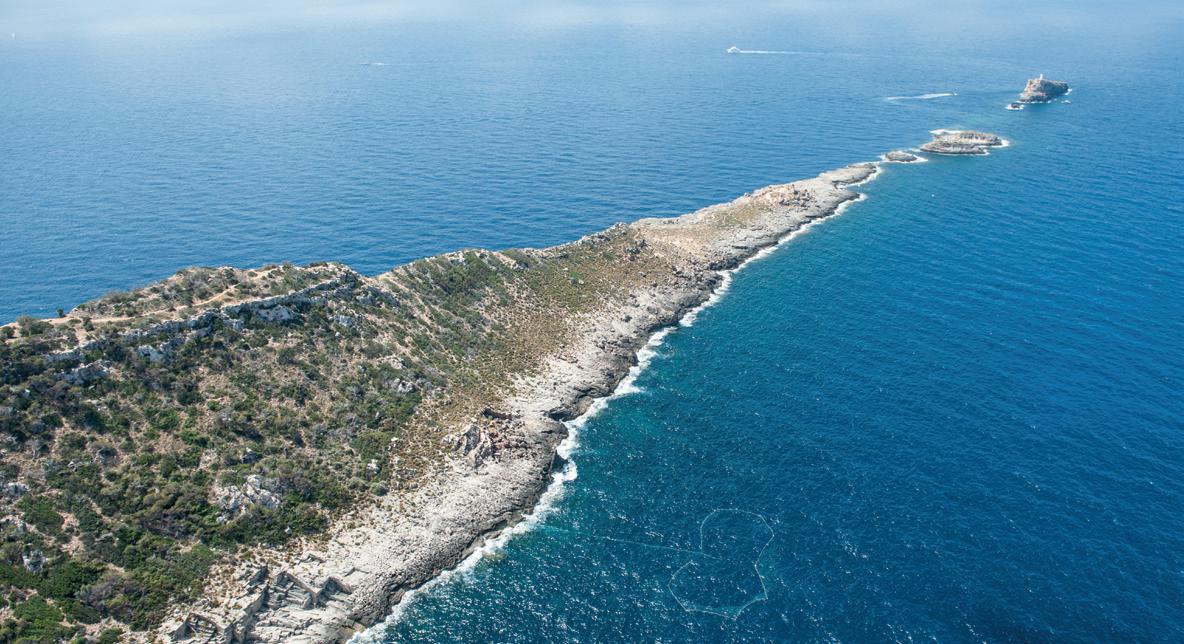
PROTECTED: The Illes del Ponent Marine Reserve

ing fish – it’s about sustainable tourism, protecting endangered wildlife (including rare birds and lizards), and supporting local fishers who use
traditional methods. It also aligns with other eco-initiatives in the area – like forest restoration at the Galatzo estate and recy-
cling water for public gardens. Local officials are calling it a ‘decisive step’ toward balancing tourism with conservation.


Voted top expat paper in
THE disappearance of three-year-old Oliver Pugh from Marbella has exposed not only the heartbreak of a custody battle gone wrong but also the dangerous influence of social media in shaping real lives. His mother, Russian ‘relationship influencer’ Anastasiia Chikina, is suspected of spiriting him away just as a Spanish court was preparing to hand full custody to his British father, Matthew. With over 140,000 followers, Chikina is no stranger to public performance. But when personal drama becomes content, the child at the centre risks becoming little more than a prop in a self-curated narrative. Her cryptic online posts, hinting at shadowy conspiracies ‘against the child’, play into an audience hungry for spectacle.
Yet behind the hashtags lies a sobering reality: a boy torn from stability, friends, and family.
The father’s desperate €100,000 appeal underlines the sheer human cost of what is no longer a private tragedy, but an international incident spanning Spain, Russia and Thailand.
The case highlights how the internet age blurs lines between activism, self-expression and reckless self-promotion.
When every decision is shared with thousands of strangers, it becomes all too easy to mistake applause for legitimacy.
Custody rulings should be contested in courtrooms, not on Instagram.
International authorities must move swiftly – and cooperatively – to protect Oliver, because parental abduction is not a victimless act.
For every ‘like’ Chikina receives, a small child remains missing.
In the battle between influence and responsibility, only one truth should matter: Oliver deserves safety, stability, and both parents in his life.
Until that happens, no amount of online justification can disguise the harm already done.
PUBLISHER / EDITOR
Jon Clarke, jon@theolivepress.es




ADMIN
Dilip Kuner dilip@theolivepress.es Walter Finch walter@theolivepress.es
Yzabelle Bostyn yzabelle@theolivepress.es
Samantha Mythen samantha@theolivepress.es
Tom Ewart Smith tom@theolivepress.es
Victoria Humenyuk Makarova (+34) 951 154 841 admin@theolivepress.es
Alex Trelinski alex@theolivepress.es
Joshua Parfitt josh@theolivepress.es
Dylan Wagemans dylan@theolivepress.es
OFFICE MANAGER
Estefania Marquez (+34) 658 750 424 accounts@ theolivepress.es
For all sales and advertising enquiries please contact +34 951 15 48 41




DISTRIBUTION ENQUIRIES (+34) 951 154 841 distribution@ theolivepress.es
A campaigning, community newspaper, the Olive Press represents the huge expatriate community in Spain with an estimated readership, including the websites, of more than two million people a month. NEWSDESK: 0034 951 154 841
WHEN a torrent of water ripped through Valencia last September, drowning streets, sweeping away cars and killing 224 people, another flood surged in parallel.
Social media, it turns out, was awash not just with images of swollen rivers and heroic rescues, but with lies, hoaxes and deliberate disinformation.
A new joint study by the universities of Valencia and Castellon has revealed the shocking scale of fake news that spread during those fateful days of the DANA storm – and why Spain remains dangerously vulnerable to the next fake news digital deluge.
The academic project found that in the days after the skies opened, hashtags about the disaster understandably trended across X (formerly Twitter), TikTok, Facebook and Telegram.
But while emergency workers raced to pull survivors and bodies from flooded streets and neighbours scrambled to save homes, another kind of frenzy was unfolding online. False videos circulated claiming dams had burst, while WhatsApp chains falsely reported that the drinking water was contaminated.
Most alarmingly of all, posts were put out that featured footage from floods in Asia and South America, passing them off as scenes from Valencia.
“Moments of high uncertainty are the perfect breeding ground for disinformation,” explained lead researcher Carles Pont.
“In these situations, citizens are desperate for information, but the speed of social media means rumours spread faster
How fake news flooded Spain alongside the deadly DANA floods that killed over 200 people in Valencia
By Dilip Kuner
than facts.”

The study analysed more than 200 widely shared posts across the four platforms, filtering out the most viral examples of fake content.
It found that disinformation fell into three main categories:
● Exaggerated claims of damage or risk – such as collapsing bridges or entire towns supposedly under water
● Health and safety scares – like contaminated tap water or poisonous animals invading urban areas
● Political blame games – with manipulated photos and memes accusing regional or national leaders of negligence
What was most striking, the researchers noted, was how easily these falsehoods gained traction. Many were boosted not just by anonymous accounts but also by well known influencers with large followings.






TTheir hugely popular sites often shared the videos without checking – and sometimes, it seems, spread the lies deliberately.
But why do these lies spread so fast?
According to the study, part of the answer lies in human psychology: In moments of crisis, people are wired to latch onto dramatic information, especially if it promises to explain the chaos around them.
But the other culprit is the technology itself.
Social media algorithms reward engage-
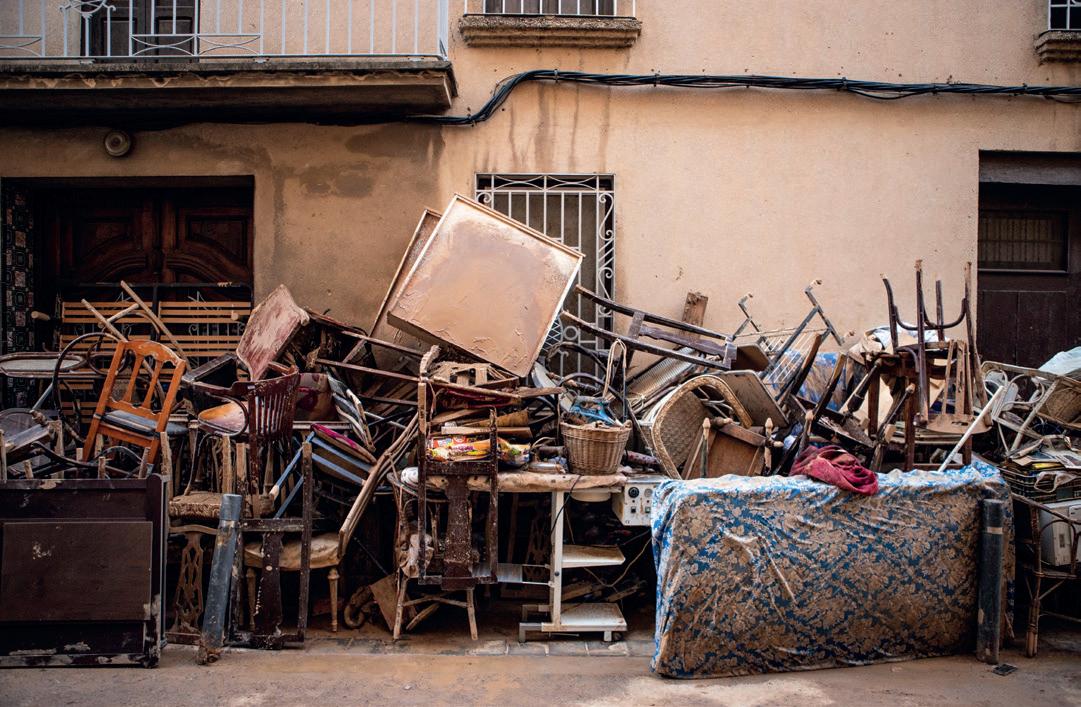
Now the bulk of holidaymakers have finally departed the costas, luxury tourism expert lays out the differences between posh Brits and Spanish ‘pijos’
By Dilip Kuner

Deposito Legal MA: 498-2019





















HEY wear designer clothes, speak with theatrical accents, and wouldn’t dream of holidaying anywhere that isn’t painfully exclusive – but Spanish pijos aren’t quite what you think. While they might look like aristocrats at first glance, these flashy figures of Iberian high society are a world apart from Britain’s discreetly posh elite, or France’s haute bourgeoisie. In fact, the pijo is in a category all of their own – and it’s one that’s as entertaining as it is revealing. In Spain, the word pijo doesn’t just describe how someone dresses – it’s a whole identity. Gustavo Egusquiza, expert in luxury tourism and a man who knows a Gucci loafer from a mile away, says it straight: pijos aren’t necessarily rich, but they want the world to think they are. “They want to be seen, recognised, imitated,” he says. Whether it’s the way





way through Oxford or Cambridge, and they probably own at least one crumbling estate in the countryside. Their accents are crisp, their manners impeccable, and they wouldn’t be caught dead in anything too loud.


they talk – full of exaggerated vowels and rolled R’s – or how they flock to the trendiest summer spots, pijos live for the image. And that image is instantly recognisable: pastel polos with the collar up, boat shoes worn without socks, designer sunglasses permanently in place, and branded leather goods they can’t quite afford.















It’s less about actual wealth, and more about convincing you they’ve got it. Compare that to the British posh – a very different beast altogether. Over in England, the truly posh don’t need to shout about their lineage. They’ve been through Eton or Harrow, spent a few years yawning their

Think battered Barbour jackets, old cashmere jumpers with holes at the elbows, tweed skirts, pearls inherited from grandmother – an effortless uniform that whispers











“Victoria Beckham? Absolutely not,” says Egusquiza. “Too visible, too new money.” Although pijos could be viewed as distant cousins to the 1980s yuppies of the UK, overall, in posh Britain, if you’re trying too hard, you’re already out. What really separates these groups, Egusquiza says, is how they spend. The British go for excellence – fine hotels, impeccable












For many expat families, one of the biggest questions after moving to southern Spain is where their children will go to school. With more than 300 international schools across the country - dozens on the Costa del Sol, alone - the choice can feel daunting.
Parents must weigh up British qualifications, the Spanish system, or, in some cases, the International Baccalaureate. Fees vary widely, curricula differ, and every
school has its own personality.

By Adam Husicka

switch tracks from Year 8 if they wish to pursue ESO and Bachillerato, or move, as some do, from the Spanish system to A-levels.
Annual fees here range from €11,178 in the early years to €24,690 in sixth form for the British track, while the Spanish system is slightly lower at €9,858 in ESO to €12,710 in Bachillerato.


es. The British route, with GCSEs and A-levels, is internationally recognised and remains the gold standard for students planning to attend universities in the UK or beyond.



Each system offers distinct advantag-





The IB, by contrast, is broader and more universal, requiring students to study subjects across sciences, arts, and maths – perfect for ‘all-rounders’, though demanding for those who prefer to specialise.


Joe Short, Head of Secondary at Laude, says this flexibility is one of the school’s biggest strengths.








“We follow the British curriculum from early years through to sixth form, preparing students for GCSEs and A-levels, the gold standard for university entry.







The Spanish curriculum, meanwhile, may suit families who see their children staying in Spain long term, as it prepares them directly for Spanish universities through ESO and Bachillerato. Many international schools along the Costa del Sol reflect this diversity, often combining different routes under one roof.
“But from Year 8 onwards, pupils can also switch to our Spanish pathway, with ESO and Bachillerato, allowing them to access Spanish universities. There’s support in place for them in all of the pathways.”





ESO Many schools


He also highlights the school’s ‘Future Pathways’ programme, which helps teenagers with UCAS applications, personal statements, and university options abroad.






Other schools lean more firmly towards one model.



For instance, Laude San Pedro International offers both British and Spanish pathways, allowing students to
Benalmadena International College, for example, follows the British system exclusively, taking pupils from nursery through to sixth form.






It also offers BTECs, giving older students a more practical option alongside traditional A-levels. Aloha College Marbella, by contrast, blends the British route with the International Baccalaureate in its upper school – providing students with the choice between depth and breadth in their final years.
ents to request full details directly.
As Short puts it: “A-levels are about depth of knowledge; the IB is about breadth. A-levels are better for many of the students that we have come through, because they can be specific.
based in Estepona, who has guided three children through a mix of Spanish and international schools, says the right choice often depends on timing.








According to the Good Schools Guide, past fees have ranged from €7,075 to €17,180 per year depending on the year group, though the school now asks par-
“On the other hand if you’ve got an all-rounder, someone who’s good at everything, IB gives you more kudos; it’s a full package.”
For families, this variety can be both a blessing and a challenge.
One long-term expat mother,
“To begin with, we chose the Spanish system because our kids were born here. We wanted them to integrate and not live in a bubble,” explained the Belgian businesswoman.
“As they got closer to university, we left the choice to them, but ultimately they all went the private route.

PROS




There are four phases:
• Educacion Infantil (Preschool) - 3 to 5 years of age (inclusive, i.e. three years). This is optional.
• Educacion Primaria (Primary Education) - 6 to 11 years of age (six years). Compulsory.
• Educacion Secundaria Obligitoria or ESO (Compulsory Secondary Education) - 12 to 15 years of age (four years).
• Bachillerato (Post-Compulsory Schooling) - 16 and 17 years of age (two years).
The Pre-school stage (infantil or popularly known as pre-escolar ) is free for all children but not compulsory. However, it is regarded as an integral part of the education system with infants’ classes at almost every primary school. There are some separate nursery schools, colegios infantile s, also.
The next two phases, primary ( colegio ) and secondary school ( instituto ) education are compulsory and free of charge. At the end of the ESO successful pupils are awarded a Secondary Education Certificate, which is necessary to enter the post-compulsory stage of schooling for their university or vocational studies. Alternatively they may leave school and get a job. Once pupils have their Bachillerato they can take their university entrance exam.
Your child will be involved in your local community eir friends will live locally ey will quickly be uent at Spanish / bilingual ere’s no need to transport your children to school It is free of charge
CONS Rigid structure based on continuous assessment Di cult for parents who don’t speak Spanish to understand what’s going on Not much creative learning, in terms of art, drama, etc.
It is relatively easy for your child to repeat a year. Re secondary education, the repetition rate is 5.5% for state institutions combined to 1.4% for independent.

PROS
Cambridge exams are provided
Caters for entry to UK universities
International Baccalaureate entry
Individualised learning plan
Constant contact with parents / partici- pation in the learning experience
Speak to educators in English
CONS
e cost each year
Paying for school uniform, that your child must wear
Less immersion of your child in their local community
Friends might live further away
Child is less likely to be uent at Span- ish
e need to transport children to school – possibly at a geographic dis- tance
e school holidays do not match Spanish holidays

“My eldest son (now at university in Scotland) preferred A-levels because he was very focused on certain subjects.
“With the Spanish system, you sort of have to choose between a scientific bachillerato, an artistic bachillerato, or humanities, and you can’t really mix them.
That’s why the IB appealed to my second son, where he could choose whatever subjects he wanted to do, aside from the core subjects.”
While she values the private options, she remains an advocate of the state system too:
“I would really encourage kids to go into a Spanish school, public or private at first. Even if you want your children to end up studying in English, you could do primary in Spanish and then

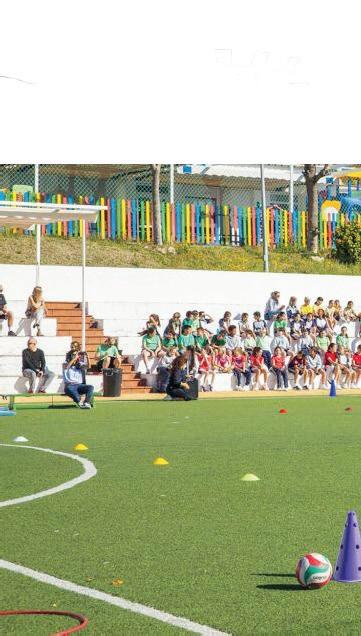
switch to an international secondary. “Having a good base in Spanish is a huge advantage if you’re raising your kids here,” she stresses. Ultimately, the decision comes down to priorities. Do you want the broad, global focus of the IB? The rigorous specialisation of A-levels? Or the rootedness of the Spanish system?
Schools like Laude, Benalmadena, and Aloha show the spectrum of what’s available – but they are just examples of a much wider picture. What matters most is not the label on the curriculum, but whether children feel supported, challenged, and equipped for the future. On the Costa del Sol, expat families have more options than ever to make sure they do.


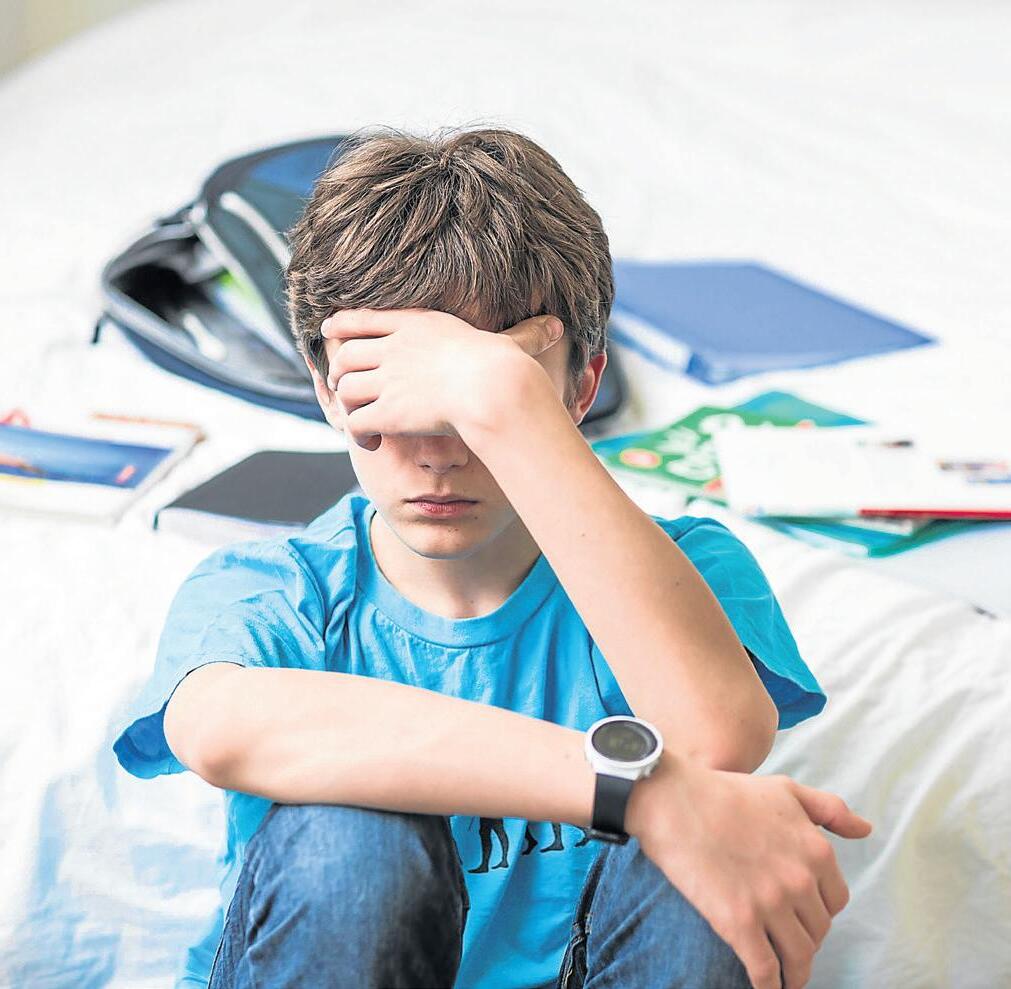
THE greatest threat to 21st century schoolkids is still cyberbullying – and in 2025, the problem is bigger, faster and harder to control than ever before. This insidious form of antisocial networking can happen relentlessly, anytime and anywhere. What was once a whispered insult or playground punch now follows children home, invading their bedrooms via mobile phones and social media.
Spain’s National Police say smartphones were the ultimate game-changer. Today, most bullying cases involve an online element, often escalating from schoolyard taunts into 24/7 harassment.
“The talks we once gave to 15-year-olds, we now give to eight- and nine-year-olds,” a spokesman warned. “Parents hand over smartphones without thinking – it’s like giving a child the keys to a car without teaching them the rules of the road.”
Mobile phones for minors is ‘like giving kids a car without explaining the rules of the road’
The numbers are stark. A 2024 report from Spain’s Ministry of Education revealed that half of children now own a mobile phone by the age of 10. By 12, that figure shoots up to nearly 80%, and by 14 it is virtually universal. Not having a phone, ironically, can itself become a reason for exclusion. Spain has tried to fight back. In 2020, Madrid banned mobile phones inside classrooms, following regions like Galicia and Castile-La Mancha. More than 1,700 schools and some 800,000 pupils were affected. Since then, other regions have followed suit, and in late 2023 the national government announced plans to extend the ban
to all public primary and secondary schools. The Education Ministry said the measure was aimed not only at raising academic performance but also at cutting off the channels through which bullying spreads. But critics argue that the real battlefield is outside the classroom walls – on WhatsApp groups, TikTok, Instagram and, increasingly, anonymous platforms where abuse is harder to track. The COVID pandemic only accelerated the crisis. Children stuck at home became more reliant than ever on social media, apps and video calls. A 2024 study by EU Kids Online found that cyberbullying cases in Spain had risen by nearly 65% since 2019, with girls disproportionately affected. And while platforms claim to be cracking down, new apps and encrypted messaging services make it harder than ever to monitor.

FACILITIES: International schools often have top-rate infrastructure
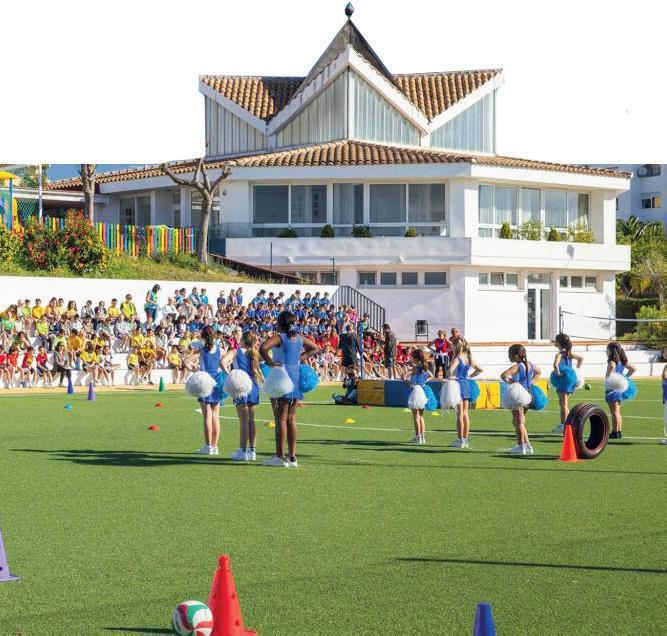


AS ‘Back to school’ season is right around the corner, parents all over the country will be fretting about the upcoming school year while their children are glued to their tablets.
To help soothe this arduous season, the Olive Press has created a list of important tasks to tackle to ensure a smooth sailing start to the year.
ask your child if there is anything they personally would add; not every child is the same, and some may work better with extra or different items.
Half a dozen things to think about before starting school, with Kayleigh Beardsley
easy experience with the bus or already being familiar with their walk will make them feel well prepared for their first day back.


One very important thing to remember when preparing your child for going back to school is clothing. Even if your school does not require a uniform, children grow very quickly in very short periods of time. New clothes that are adequate for all weather types and that fit your child perfectly are necessary for back-to-school prep.


Lunch is a big part of the school day, and sometimes it is a child's favourite hour. Whether pack-up or school dinner, making sure they have either money or food is essential. For school dinners, it's pretty simple—setting aside some money every day for them. Packed lunches are a little more complicated, but they are great for picky eaters or for you to keep tabs on what your child is eating. Some schools have some strict rules about the contents of the lunchbox, so check in to see if anything is prohibited.
Children may not like having tags in their clothes as it is not ‘cool’ but having your child's name in their uniform can be a game-changer. No more rummaging around in a pile of jumpers left in a pile at school. In addition to adding their names to their clothes, getting them to wear in their shoes is a life saver. The first day of school may be daunting for them anyway, why add uncomfy shoes to the mix? Letting them wear their shoes means no blisters on the first day and one less thing for them to worry about.
















The list of equipment your child needs will grow exponentially as they get older. Helpfully, schools sometimes send out lists of what you will need, from pencils to protractors. It may also be helpful to
Whether your child is starting at a new school and you haven’t decided on the best way to get them there or you need to get them a bus pass, having travel to school sorted is imperative. It’s the first obstacle for your young ones on their first day back and having an
As soon as your child has got one, print out a timetable so you can keep up to date with what they need everyday. Gone are the days of being told they have no ingredients for their food tech lesson or PE kit for their PE lesson. Not only does this help for classes but also for any after school clubs.




AS Spain’s new academic year gets underway this September, one issue remains stubbornly unresolved – the gender gap in science and technology.









Despite girls performing just as strongly as boys in maths and science at school, only three in ten young women in Spain choose to pursue STEM careers.
Women need science, and science needs women




By Yzabelle Bostyn









The result is a shortage of female role models in labs, lecture halls and tech companies – a problem that experts warn is holding back innovation at a time when the world desperately needs more scien-
talent to tackle climate change, energy security and health crises.






Globally, the picture is much the same. Just 33.3% of scientific researchers worldwide are women, while only 35% of STEM students are female. Yet studies continue to show that girls and boys achieve similar results in science and mathematics during their school years. The challenge is turning that talent into lasting careers.


CO has warned. “Only by tapping into all sources of knowledge and talent can we unlock the full potential of science and meet the challenges of our time.”

atildas, a campaign tackling the socalled ‘Matilda Effect’ – the tendency for women’s scientific achievements to be overlooked or attributed to male colleagues.
The group has developed storybooks reimagining famous discoveries with women at the forefront, alongside an annex to Spanish textbooks that restores female scientists left out of the historical record.




“Women need science, and science needs women,” UNES-





In Spain, the imbalance is particularly stark. While women dominate in care-related professions such as nursing – making up around 82% of the workforce – they remain under-represented in fields like engineering, physics, computer science and technology. Only one in four Spanish university professors are women, and just a quarter of scientists cited in the Spanish press are female. There are signs of progress.


A study by the Universidad Rey Juan Carlos found that the proportion of female scientists in Spain rose from 9% to 34% between 2015 and 2020, a trend that campaigners hope to accelerate.
One of the most visible initiatives is #NoMoreM-
Their message is clear: inspiring today’s girls requires showcasing yesterday’s forgotten pioneers. Spain is not alone in its struggle. In the UK, for example, women make up just 31% of STEM higher education students, and only a quarter of those graduates go on to work in related fields. Across Europe, the gender gap is seen as a brake on progress. Clearly, the problem is international –and the solutions will need to be too. As the #NoMoreMatildas campaign puts it: “It makes no sense to use just half of the minds we have at our disposal to fight the challenges we face.


SHACKLETON International School in Burjassot, Valencia has recently reached a major milestone, officially joining the global network of IB World Schools.
From September 2026, Sixth Form students in Years 12 and 13 will be able to study the renowned International Baccalaureate Diploma Programme (IBDP).
The school’s leadership sees this as more than an academic achievement. Head of IB Alicia Ocón, supported by the secondary teaching team, led the extensive authorisation process, which involved curriculum designing, teacher training, and engagement
with the wider school community. Their dedication has become the foundation for what promises to be a transformative chapter for students.
The IB Diploma Programme is designed to challenge students intellectually while fostering personal development. Alongside a broad range of subjects, students take part in the Extended Essay, Theory of Knowledge, and Creativity, Activity, Service (CAS) components. These elements encourage students to ex-
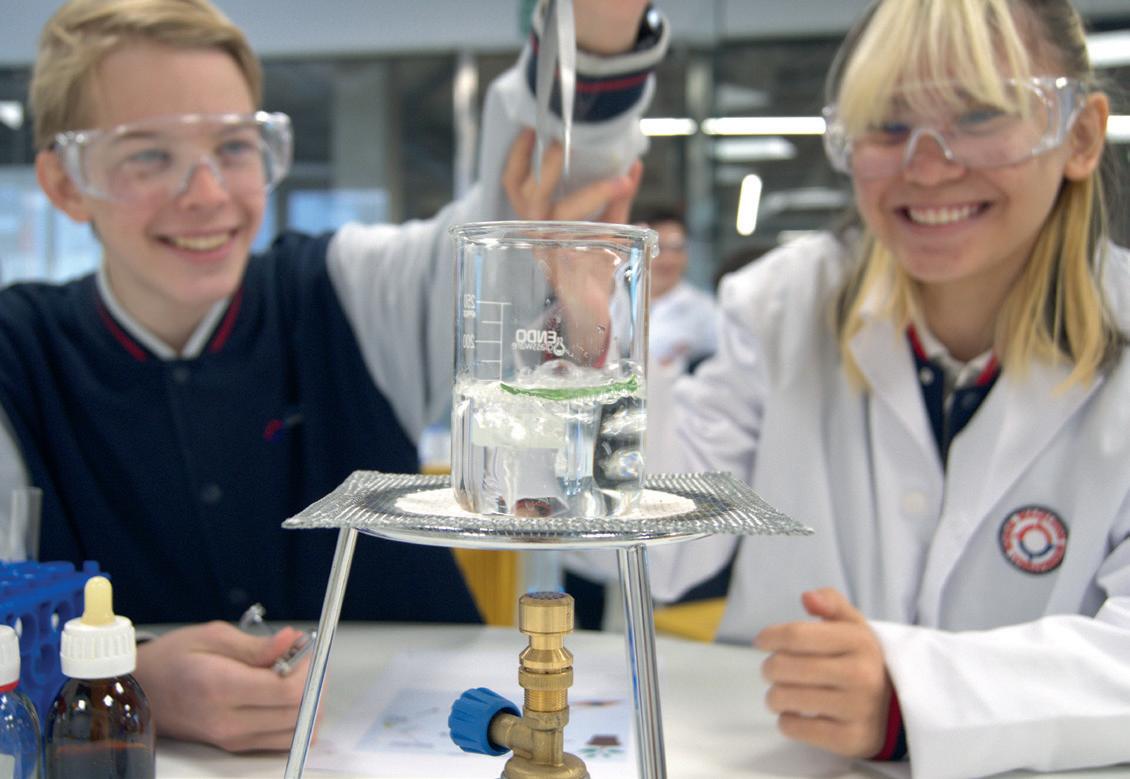
plore complex questions, connect learning to real-world issues, and contribute positively to their communities. What distinguishes the IB is its balance between academic rigour and the cultivation of critical life skills. Graduates leave with a qualification recognised by leading universities worldwide, but also with resilience, curiosity, and an interna-
tional outlook that equips them for life beyond the classroom.
For Shackleton, the IB complements its philosophy. The school already serves a diverse student body from over 50 nationalities and prioritises wellbeing, inclusion, and a sense of belonging. By implementing the IB Diploma, Shackleton reinforces its commitment to nurturing students who are academically capable,



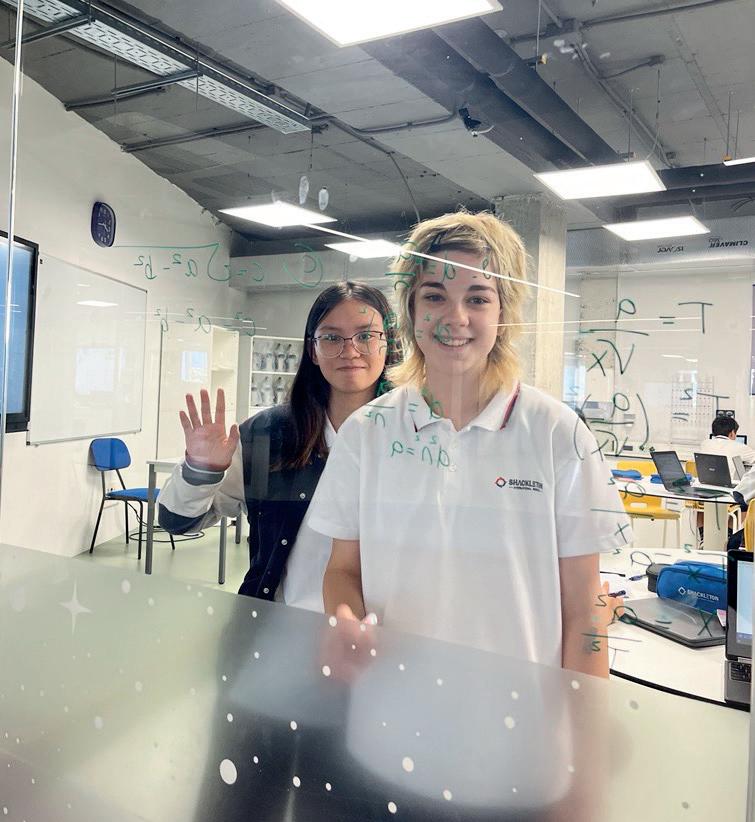
LEARNING FUN: Students are challenged intellectually, while personal development is fostered
emotionally intelligent, and globally minded. Beyond academic excellence, the school aims to make the IB experience engaging and inspiring. Students will have opportunities to develop leadership skills, participate in collaborative learning, and take part in community-focused initiatives, ensuring their education extends beyond the classroom and
prepares them for a rapidly changing world. Shackleton now offers a world-class education without leaving Valencia, opening doors to universities and careers worldwide. The school invites parents and prospective students to visit, meet the team, and discover how the IB Diploma can inspire young people to achieve their full potential.


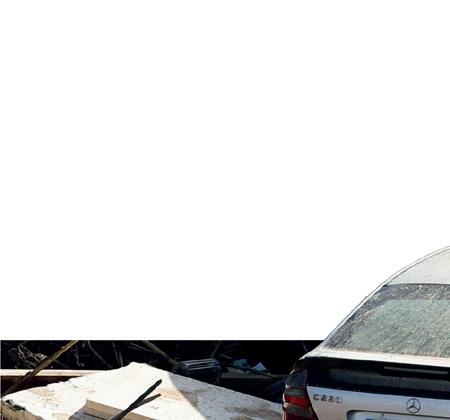
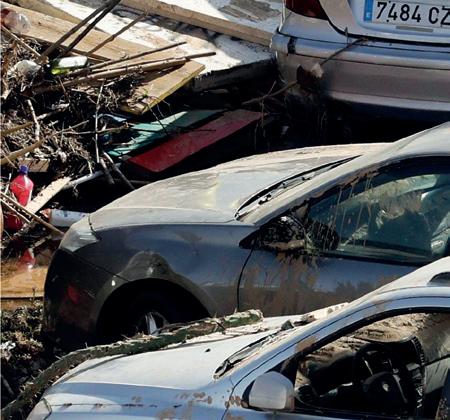
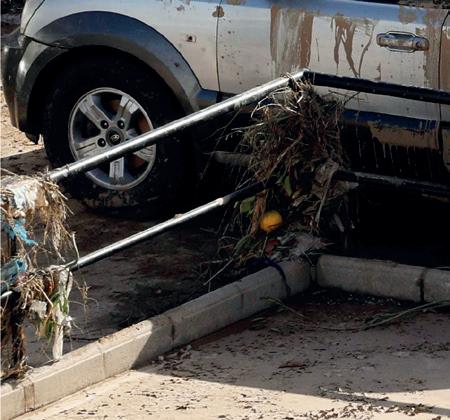
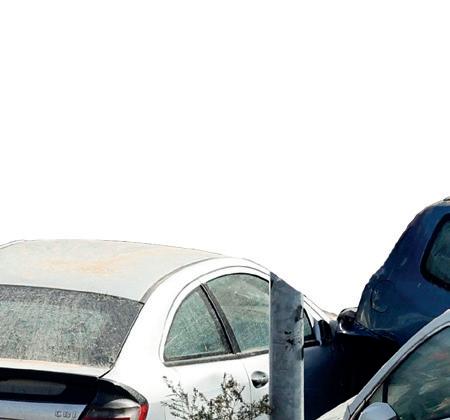
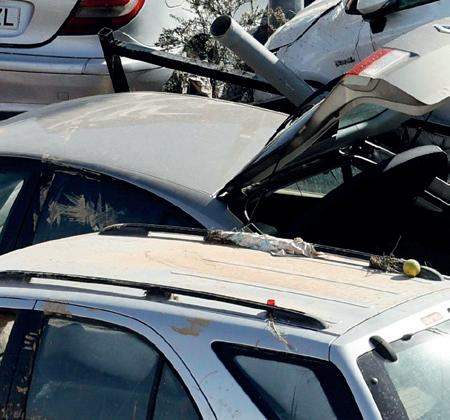
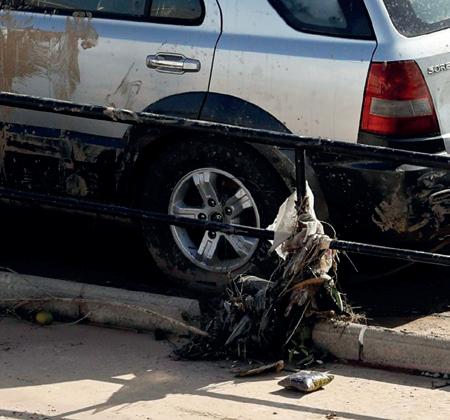
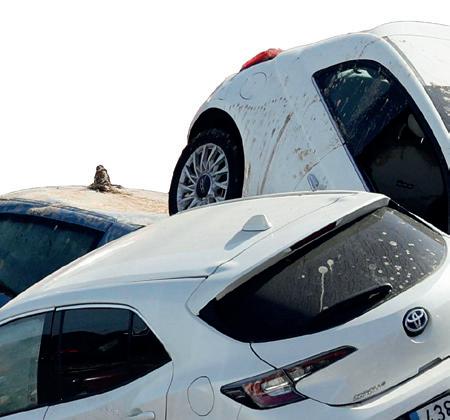
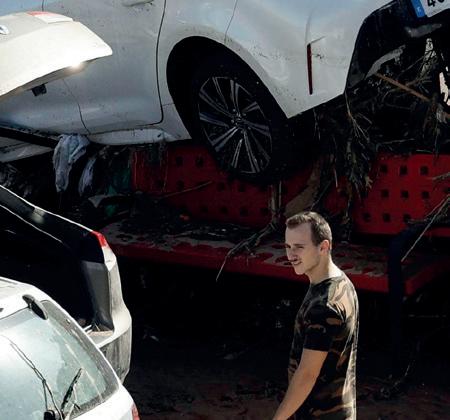



ment – and shocking, scary or angry content always triggers the most clicks, shares and comments.
“In a way, the platforms themselves act like accelerants,” said Pont. “They don’t distinguish between true and false. They only measure which posts keep people scrolling.” For residents already reeling from the storm, the fake news made things worse.
Some neighbours stopped drinking tap water unnecessarily. Others avoided certain roads after reading rumours they had collapsed. In several cases, emergency hotlines were jammed with callers trying to verify wild stories they had seen online.
“All this disinformation puts extra pressure on the emergency services, which are already stretched to the limit in these situations,” added co-author Ana Segovia.
There were some brave attempts at a pushback: Spain’s small but determined network of fact-checking organisations – including Maldita.es and Newtral –swung into action during the crisis.
Their teams quickly published corrections, debunked hoaxes and tried to push reliable information through the noise.
including from some well known aggregate ‘news’ sites in English. But their reach was more limited this time. While their careful fact-checks cir-


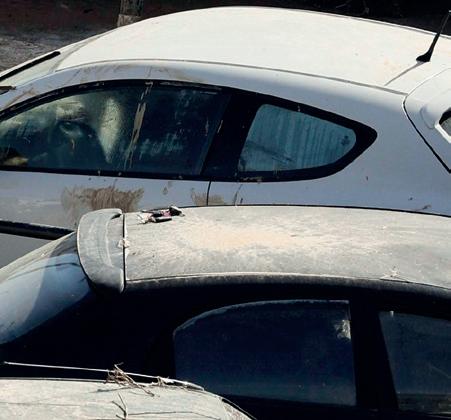

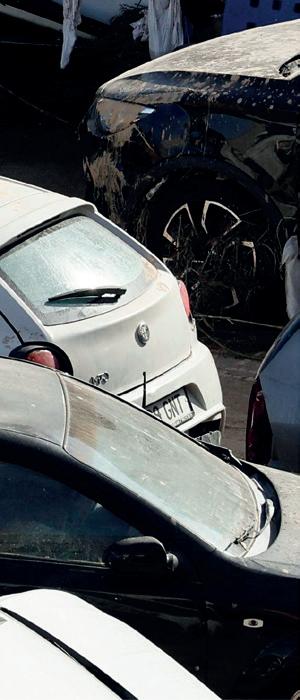

culated within certain audiences, they never achieved the viral momentum of the false posts they were battling.
“It’s like bringing a bucket of water to fight a wildfire,” admitted one fact-checker interviewed for the report.
The academics behind the study warn that the Valencia case should serve as a wake-up call for Spanish authorities and social media firms alike.
Maldita did the same during the COVID crisis, by calling out dozens of fake news reports,
service, perhaps a quiet jaunt on the Orient Express.
But Spanish pijos? They’re after visibility. They want to be at the right beach club, the trendiest terrace, the most photographed festival.
It’s not always about quality – it’s about being seen in the right place, even if you’re sipping cava on a budget.
For Egusquiza, the real luxury is the quiet kind.
He points to boutique hotels like Palacio de la Helguera or Arbazo in San Sebastian, where service and subtlety are the true markers of class. “True luxury doesn’t shout. It whispers,” he says.
But whispering isn’t really the pijo way. They’re about impact – the look, the statement, the selfie.
Even traditional pijo holiday spots like Palma, El Puerto de Santa Maria and Baqueira, for skiing, are starting to suffer from their own popularity.
When a place becomes too fashionable, says Egusquiza, it loses its exclusivity – and the pijo charm starts to fade.
The truly wealthy, he claims, aren’t chasing the crowds. They’ve moved beyond the need to be seen.
In the end, the Spanish pijo is more than just a fashion statement or a stereotype. They’re a cultural phenomenon – louder than the Brits, but completely, unmistakably Spanish. In a society where appearance often matters more than reality, the pijo has perfected the art of seeming wealthy. Whether they actually are? Well, that’s beside the point.











Climate change is expected to make extreme weather events like DANAs more frequent and severe in Spain.
Each one is now likely to trigger a parallel surge in online disinformation. After all, the social media sites studied all make their money by serving ads to their followers.
To them, tragedy equals money!
The new report argues that citizens need better ‘digital literacy’ training to help people spot hoaxes in real time.
Schools, they suggest, should teach children not just how to use social networks, but how to distrust them.
They also call on social media companies to step up.
“We are not asking for censorship, but for responsibility,” insisted Pont. “Platforms must design systems that reduce the spread of dangerous falsehoods, especially during emergencies.”
The Spanish government has already been working on disaster readiness, from improving flood defences to strengthening the coordination of emergency services. But experts now say digital resilience should be part of that plan.
“When we talk about protecting communities, we must include protecting them from lies,” said Segovia. “Misinformation can kill indirectly – by causing panic, delaying rescues or undermining trust in the authorities.”

Perhaps the greatest damage, the researchers warn, is long-term.
Each viral hoax erodes the public’s trust in real information sources. If people start doubting everything, they may ignore crucial warnings in future crises.
“This is the paradox,” Pont explained. “Disinformation makes people distrust institutions. But in an emergency, those institutions are the ones best placed to save lives.”
For the people of Valencia, the scars of the 2024 DANA are still raw. Families are rebuilding homes, small businesses are counting losses, and local councils are demanding more investment in defences.
But the digital flood revealed by this new study may be even harder to contain. As Spain braces for more extreme weather, the battle against fake news could prove just as important as the fight against rising waters.
Because when the next storm comes, the lies will come too. And unless Spain is ready, the damage they cause could spread just as fast as the flood itself.
From killer crocs to poisoned pipes, the storm showed that fake news can travel just as fast as floodwater – and cause almost as much chaos.
● The bursting dam Doctored videos claimed a major reservoir had collapsed, sending a deadly wall of water crashing into towns. Completely false – but it caused panic in low-lying areas.
● Poisoned tap water WhatsApp chains insisted the mains supply was contaminated. Families stopped drinking it, and supermarkets ran low on bottled water before officials debunked it.
● Crocodiles in the streets Clips of reptiles wandering flooded towns (actually filmed in Asia years earlier) were passed off as Valencia. Enough people believed it to clog police phone lines.
● Collapsed motorways
Old footage of road sinkholes from South America was recycled as ‘Valencia right now’, convincing drivers to avoid safe routes.
● The underground carpark Claims on social media that it contained the bodies of hundreds of people trapped by the floods were totally unfounded. Firemen found no bodies.












AS parents across Spain scramble to stock up on uniforms, books, and stationery for the new school year, it’s easy to forget one crucial item for growing (and adult) minds: knowledge.
Whether it’s the latest laws on borders, reasons behind natural disasters or the coolest hotpots worth visiting, there is so much new to learn each week.
The Olive Press is offering a special backto-school gift subscription aimed at teenage children, university students, or anyone eager to improve their English while learning about Spain and the world.
Best of all, anyone can give a subscription as a ‘gift’ – parents, relatives, friends, or even employers looking to encourage learning.
Gift subscriptions are available at a discounted rate of just €24, making it easy to provide a full year of news, culture, and educational content.
Extra special rates of just €15 are also available for existing subscribers.
Institutions are encouraged to take part too. Schools, universities, town halls, banks, embassies, consulates or other organisations can be provided multiple subscriptions at tailored rates.
This is for small groups of 10 to 15 people to entire schools of over a thousand pupils and staff.
This back-to-school offer is not just about reading the news – it’s about nurturing inquisitive minds and helping young people engage with the world around them.
A subscription to our award-winning platform is a gift that keeps on giving, all year long.
And it is not just for schoolchildren - anyone can gift a subscription to anyone they want.

For anyone interested, please make sure you register on our website and await the special discount code by email over the weekend.
Why not gift an educational subscription to the Olive Press and for other subscribers scan this QR code




IT is often said that life in Spain isn’t just lived – it is enjoyed. Sunshine, shared meals, and a rhythm that feels a little lighter are what draw so many people to make the move.
But between the dream and reality, there are practical hurdles to cross. For many newcomers, one of the earliest surprises is how different the energy system can feel compared to back home. Tariffs, time bands, standing charges – and all explained in Spanish – can turn a simple utility bill into an afternoon of head-scratching.
This is where companies like Energy Nordic step in. Born on the Costa del Sol and built with international residents in mind, the company understands that living abroad isn’t just about adapting – it’s about feeling supported.
Energy Nordic’s team, fluent in six languages, does more than explain bills. They provide clarity, advice, and genuine peace of mind. Many of them know firsthand what it is like to start fresh in a new country, so their focus is always on keeping things straightforward and stress-free.
And while electricity might not be the most glamorous part of your new Mediterranean life, it’s an essential one. Knowing your energy supply is reliable – and that there’s a friendly voice ready to guide you through questions – means you can get back to the things that matter most: enjoying tapas with friends, soaking up the sun, or simply embracing a slower pace. Because settling in isn’t just about where you live. It’s about the little details that make you feel at home. And sometimes, clarity and kindness can light the way more than anything else.
more information visit energynordic.com, call 900 696 820 or email info@ energynordic.com
By Dilip Kuner
IF you want to see Barcelona at its most vibrant, then start planning your trip for the La Merce Festival.
From September 23 to 28, the Catalan capital comes alive

for its biggest festival of the year, celebrating the city’s patron saint, Mare de Deu de la Merce.
ARCHAEOLOGISTS in Ecija (Andalucia) have uncovered a Roman treasure that’s almost two millennia old – a stunning 40-square-metre mosaic that once graced the dining and reception room of a 1,200-square-metre, two-storey palatial home. The find, which con-
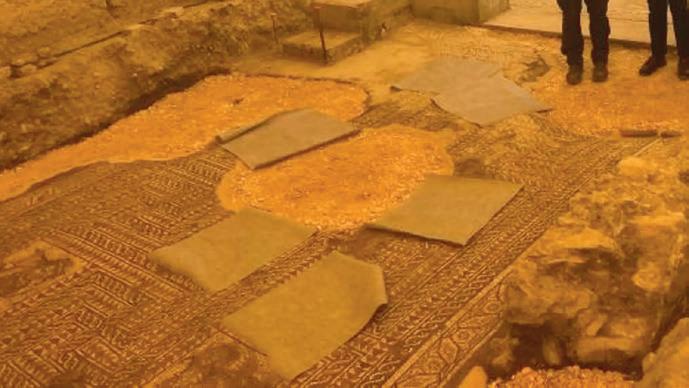
















Dating back to 1871, La Merce transforms the streets into an open-air stage, with hundreds
sists of about 60% of its original surface, isn’t just massive – it’s a window into the opulent lives of provincial Roman aristocrats. The floor, or ‘oecus’, features dazzling geometric motifs, vibrant glass tiles, and even seasonal allegories alongside images of birds like partridges and pheasants. The colours are unusually vivid, with rich blues reserved for the wealthiest of households.


Experts estimate the main residence alone may have had around 400 square metres of mosaic flooring, with some rooms requiring up to two million individual tiles.








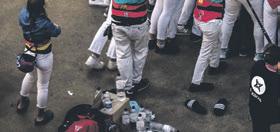

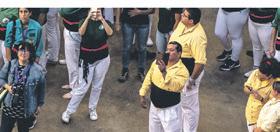



of events – many free – drawing tens of thousands of visitors alongside locals.
Start with the gegants and capgrossos, towering papier-mâche figures representing historical and mythical characters, parading through the city’s squares. Then, if you’re
feeling brave, join the correfoc – a fiery procession of devils and dragons weaving through the streets with sparks flying. Protective clothing and goggles are essential for anyone planning to get close. No trip is complete without watching castells, Barcelona’s iconic human towers. Teams of castellers build structures several stories high, culminating with the smallest member – often a child called the enxaneta – climbing to the requir-







top and raising a hand to complete the tower. Each year, La Merce welcomes a guest city; in 2025, it’s Manchester, UK. Visitors will enjoy performances, cultural exchanges, and artistic collaborations from across the waves. Music lovers can also enjoy the BAM (Barcelona Accio Musical) festival, featuring local and international artists across multiple city venues. Traditional Catalan music, street theatre, dance, and circus acts ensure there is something for everyone.
Museums across the city open their doors free of charge, and the festival also coincides with events like Catalan Book Week, promoting literature and reading. The festival concludes with the spectacular Piromusical on Sunday, September 28 at 10pm on Montjuic. The 20-minute fireworks and light show, now featuring drones, is set to music and can be enjoyed from rooftops, windows, or balconies across the city.

SPAIN’S jobless total rose by 22,000 in August to stand at 2.4 million - the lowest August figure since 2007.
The end of the high summer tourist season and cuts in staff working in education are behind last month’s increase.
The number of people registered with Social Security fell by 200,000, meaning that Spain’s official workforce stands at 21.6 million.
It ends a sequence of eight consecutive months when there were increases in Social Security registrations.
It was the biggest August fall in the registration total since 2019 and is an indicator that the country’s labour market still has a strong seasonal element to it. Nevertheless, the government is keen to point out that the trend is very much in the right direction.
The Social Security Minister, Elma Saiz, said: “The labour market looks favourable with remarkable figures in both quantity and quality of employment.”






FREELANCERS in Spain are finally seeing their pensions climb above the €1,000 threshold, after years of lagging behind salaried workers.
By Adam Husicka
According to new figures published on Tuesday by the Social Security ministry, the average retirement pension for the self-employed has reached €1,010/ month in August, paid in 14 installments.

Across: 6 Bavarian, 8 Clad, 9 Letter-writer, 10 Strad, 11 Teeming, 14 Optimum, 16 Among, 19 Machine tools, 21 Alum, 22 Ice sheet.
Down: 1 Pastrami, 2 Piers, 3 Gnarled, 4 Scat, 5 Warren, 7 Agent, 12 Mammoths, 13 Tunisia, 15 Pimple, 17 Nolte, 18 Beset, 20 Come.
This marks a record high and confirms a steady rise since January, when the average first crossed into four digits.
Until recently, most self-employed

workers paid into the system based on the minimum threshold, leading to significantly lower pensions compared to salaried employees.
Under the reformed model, in effect from 2023, contributions are now tied to real declared income, with the first payment adjustments taking place in 2025.
The change has triggered faster pension growth for freelancers than for employees - 5.3% in the last year compared to 4.7% for salaried workers.
Spain’s overall pension expenditure also hit a record high, reaching €13.6 billion in August to cover over 10.3 million benefits - a 6.1% increase year-on-year.
The rise reflects not only automatic pension revaluations and inflation-linked boosts but also higher earnings histories of new retirees.
Looking ahead to 2025, more reforms are on the horizon, including a cut in the standard working week, mandatory digital time tracking, a 5% hike in minimum wage, extended parental leave, and greater protections for interns.
SPAIN’S tourism industry is on track to hit €260.5 billion by the end of 2025, accounting for nearly 16% of GDP, according to new figures from the World Travel & Tourism Council (WTTC).
The record-breaking forecast represents a 4.7% increase yearon-year, with the sector expected to support 3.2 million jobs - around 14.4% of total employment.
International visitor spending is projected to hit €113.2 billion, while domestic travel will contribute another €84.9 billion. In 2024, Spain’s tourism sector generated €248.7 billion, with Brits making up 20% of international arrivals, followed by France (14%) and Germany (13%).
WTTC says Spain is well positioned to lead global tourism thanks to innovation and sustainability.
SPAIN has lost out on a massive €45 billion submarine contract, after Canada rejected a bid from Spanish stateowned shipbuilder Navantia. Instead, Canada’s government, now led by former Bank of England governor Mark Carney, has advanced with proposals from Germany and South Korea to upgrade its submarine fleet.
The blow came despite intense lobbying by Spain’s finance minister Carlos Cuerpo, who flew to Canada last October to push Navantia’s case with then-leader Justin
Trudeau. Navantia’s S-80 submarines reportedly failed to impress Canadian military officials due to lacking an air-independent propulsion (AIP) system - a feature included in Germany’s Type 212CD subs. India also rejected the S-80 for similar reasons, citing outdated technology.

‘FACTOR investing’ is the process of constructing an investment portfolio that contains groups of stocks (or other assets) with certain traits, such as being fast-growing, stable, or cheap. These traits have historically delivered* excess returns or reduced risk (or both) as compared with the market. The factor investing framework has been gaining widespread popularity. A decade ago, nearly one half trillion dollars was invested via factor investing in the United States (if a half trillion is too difficult to conceptualize, think of it as ‘500,000 million dollars’). Today this market has expanded to more than 2 trillion dollars (or ‘2,000,000 million dollars’). Academic research – that considers decades of portfolio experience – has identified common characteristics or ‘factors’ that help explain why some stocks might earn higher returns than others. Some of these factors include:
● Value: Buying undervalued securities that are cheap relative to a company’s financial fundamentals (e.g., low price-to-earnings ratio). Value investors believe every company has a true value (intrinsic value). When
the market price of a company’s stock falls below this intrinsic value, investors can buy low and wait for the market to recognize its worth.
● Size: Favoring smaller companies, which historically outperform larger ones over the long run. The size of a company is defined by its market capitalization (total number of shares outstanding times the price per share). Large cap stocks (often defined as having a market cap of $10 billion or greater in the United States) are often safer but don’t typically exhibit the same growth as small cap stocks (defined as having a market cap between $300 million and $2 billion).
● Momentum: Investing in stocks that have recently performed well, based on the assumption that trends tend to continue. Momentum investing can be like surfing, where you try to ride the wave of recent successes, knowing you need to get off before it crashes.
● Quality: Focusing on companies with strong profitability, stable earnings, and low debt.

It is a strategy that focuses on buying companies with strong financial health, regardless of their size and whether they are “cheap” (value) or have momentum. Good qual-

ity companies are more likely to deliver stable earnings and long-term success.
Factor investing is broader than selecting individual stocks because multiple stocks that share given factors are typically purchased. At the same time, it is narrower than index investing (which buys all the securities that comprise the index).
Each factor has its own cycle of outperforming and underperforming the market. Factor investors typically build balanced portfolios which they often
tilt toward the factor(s) they believe will currently perform best. By combining factors, investors can smooth returns because different factors often have low correlation (i.e., they don’t all work at the same time).
Much like eating at a buffet, a multifactor strategy investor may not equally enjoy everything on their plate but combined it makes a well-balanced meal.
*We all know that past performance is no guarantee of future results.
However, if past performance provides no indication at all of how to invest for the future, researchers would be left with nothing to study. So, when it comes to factor investing, I need to choose my words carefully and say “delivered” not “do deliver” and under no circumstances can I say ‘will deliver’.

‘Miracle’
By Alex Trelinski
EXPERTS have warned about the risk of going on ‘miracle diets’ after the summer holidays.
The Valencian College of Dieticians and Nutritionists says serious issues can arise from quick and substantial weight loss.
That includes cardiovascular damage and muscle degeneration plus nutritional deficits. It says crash diets are mainly characterised by promising rapid weight loss by restricting

food groups or nutrients or or simply based on eating a single type of food.
Well-publicised diets include detox methods which base food intake on drinks and shakes that promise a ‘purifying effect’.
There are also excess hypo-caloric diets which reduce calorie intakes at the expense of
A NEW study suggests beta-blockers offer no benefit to most heart attack survivors.
Traditionally prescribed to protect the heart, these drugs, which slow heart rate and force, appear unnecessary for patients with uncomplicated heart attacks.
Researchers at the Centro Nacional de Investigaciones Cardiovasculares (CNIC) say around 70% of survivors retain normal heart function, meaning daily beta-blocker use may be redundant.
Lead investigator Borja Ibanez called the findings ‘a paradigm shift’.
eliminating entire categories of beneficial foods, and mono-diets where people consume just a single type of food.
Valencian nutritionist, Natalia Gil said: “All of them generate large deficits in the body and serious health problems.”
“If you go on a diet without the
advice of a registered expert, we deprive our body of the basic nutrients that our organs and systems need to function properly,” she explained.
“This brings with it a greater cardiovascular risk and alterations in kidney and liver function, as we notice more fatigue and an accelerated loss of muscle mass.”
“We can also suffer metabolic alterations and a greater risk from chronic diseases such as diabetes,” Gil added.
According to the Valencian College, three out of four people who come to see one of their members had previously tried a magic diet.
“Social networks are the main source of information when looking for this type of food practices,” commented Gil.
“In them we find diets that go viral and that unfortunately are not promoted by health professionals.”




with our 2 for 1 glasses from 69€









A RECKLESS driver in Malaga smashed a stolen car into a police vehicle after a high-speed chase through the Guadalhorce estate. He fled on foot but was later arrested.
BARCELONA’S Sagrada Familia is offering 20,000 free tickets during La Merce festival, September 19–24. Normally €30, entry will be via online draw closing September 14.
A 40-year-old delivery driver was seriously injured in Playa del Ingles, Gran Canaria, after a pallet of beer barrels toppled onto him. Firefighters freed him before paramedics rushed him to hospital.
A BRITISH expat has been accused of hypocrisy after stating she moved to Spain because ‘there’s too many foreigners in the UK’. The comments, made in an interview with conservative British broadcaster GB News in Benidorm, have been met with criticism on social media - with some
By Walter Finch
users saying: “You really couldn’t make this up!”
Asked by GB News reporter
Dougie Beattie to explain why she moved to Benidorm permanently, the unnamed lady replies: “You’ll probably edit it out because
SPAIN has been crowned the baldest nation on earth, with a survey finding 44.5% of men suffer from male pattern baldness. That’s higher than anywhere else in the world – edging out Italy (44.3%) and well above France (42.2%) and the US (42.7%). Germany also made


there’s too many foreigners in the UK.”
“We lost our rights, freedom of speech went!’ she adds, before declaring: “Britain lost the plot 20 years ago, sorry!”

British expat mocked after revealing ironic reason for moving to Benidorm
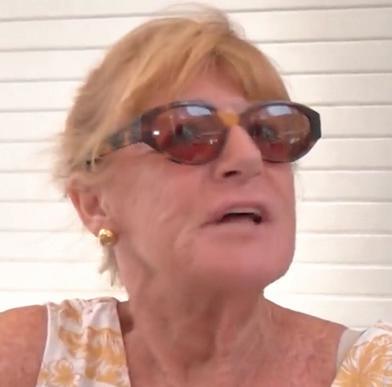
The lady’s friend then chimes in to have a pop at the current British government, describing Sir Keir Starm-
the top five with over four in 10 men balding. Britain wasn’t far behind, with 40.1%, while neighbouring Ireland (38.7%) and Portugal (33%) fared better. The survey revealed a stark global divide: men in Europe, North America and parts of the Middle East are far more likely to lose their locks, while those in Asia, Africa and Latin America keep their hair for longer.
er’s Labour administration as ‘crap’ and ‘the worst government ever’. The comments were slammed by social media users who were keen to point out






the irony of someone complaining about foreigners in their home country, only to become one themselves.
“Too many foreigners in the UK says the foreigner in Spain,” said one user on X
“Good to see they’re enjoying life in Spain, which is run by a Socialist Workers Party government!” gibed another user.
“Such minds gave us Brexit,” added David Head, a translator and writer.
Benidorm is one of the most popular destinations for Brits seeking some Spanish sunshine.
The city is home to almost 3,500 British residents, representing around 5% of the population, while more than 900,000 British holidaymakers paid a visit last year.
A CASH machine stunned passers-by when it began spitting out bank notes late at night. The bizarre malfunction saw a shower of €10, €20 and €50 notes scatter across the pavement in Torre Pacheco, Murcia –despite the fact that no one was using the ATM at the time.
Fortunately for the bank in question, the first person to come across the unexpected bonanza was a very honest neighbour. This Good Samaritan immediately called the Policia Loca and in the meantime started gathering up the billowing notes. Not a euro was lost with police recovering €2,000. The next morning bank staff explained the cash had been deposited just minutes earlier.


